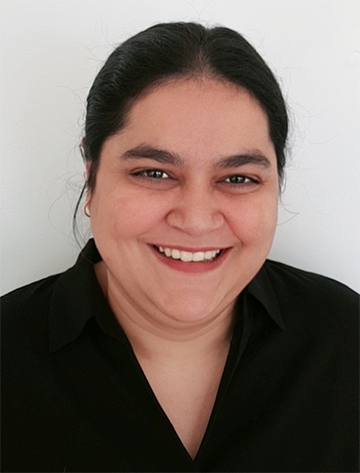
Krishna Agarwal
In this installment of Senior Member Insights, OPN talks with Krishna Agarwal, an associate professor in the department of physics and technology at UiT The Arctic University of Norway. Agarwal received her Ph.D. from the National University of Singapore in 2011 and her B.Tech. degree from the Indian Institute of Technology (Indian School of Mines), Dhanbad, India, in 2003.
Agarwal was a postdoctoral associate at Singapore-MIT Alliance Research & Technology Centre from 2014 to 2016, and a research fellow at National University of Singapore from 2010 to 2014. She was also a scientist at the Defence Research and Development Organization, India, from 2003 to 2006 and worked towards developing the front end of active-phased-array radars. Her current research interests are computational nanoscopy, label-free nanoscopy, super-resolution imaging and inverse problems.
Agarwal received the “Distinguished Alumnus Award” from the Indian Institute of Technology (Indian School of Mines), Dhanbad, India for the year 2020, and was awarded a Marie Skłodowska-Curie Actions Individual Fellowship for the year 2017-2019. She leads and co-leads several research projects funded by the European Union and the Research Council of Norway. In 2011, she was awarded the “Young Scientist Award” by Union Radio Scientifique Internationale (URSI).
What first interested you in pursuing science?
A variety of factors, but primarily an inspirational teacher in school. Other main factors include a short-story-like essay on Madam Marie Curie, and that science was considered a difficult stream to pursue in my community.
What aspect of your current work do you find the most interesting or exciting?
That I am living my dream! I am doing the scientific research that I want to do, and I am working with excellent young minds who are equally passionate about research. I get to contribute positively to these young scientists and get new perspectives and youthful energy from discussing with them. I am able to create value for society through science.
What tips for successful networking do you have for early-career professionals?
Be a go-getter! Do not wait for things to happen. Do not wait for others to approach. Do not wait to be introduced.
What professional resources do you rely on to stay active and engaged with your field?
Optica (formerly OSA) and IEEE networks (also national networks such as the vibrant and active Digital Life Norway) and their resources. Conferences of large scale (for exposure and interaction of a wide variety) and focused conferences (for networking with the niche groups). YouTube videos and blogs. We are now warming up to social media platforms such as LinkedIn and Twitter, seeing the bandwidth of outreach. I also spend time on web pages of important journals to watch for trends. We organize bi-weekly meetings in my team for soft-skill development through simple exercises and discussions.
What skills do you think are most important for someone interested in a career like yours?
I believe that most scientists do work on developing skills relevant to their own research field/topic. But, trans-disciplinary skills and skills to work in multi-disciplinary teams are also quite useful. It is also important to invest some time and energy in developing communication science and research skills across various formats—writing, graphical illustrations, presentations, videos, etc. Of course, one may find where their strengths are and look for help/support on the other aspects. Skills related to networking and exposure to innovation are also quite helpful.
What advice do you have for young scientists who are discouraged about their current work or career path?
There is sometimes a discouraging notion that we have missed the bus to our destination or have not been as successful as we hoped in what we wanted to do. But, there are many more buses taking us to our destination or to other destinations that we did not think about. All it means is just a little bit of delay, and all it needs is a little bit of courage to give the next bus a chance.
What is one piece of advice that you wish you were given as a student/early in your career?
Scan through articles from a wide variety of publication venues on a topic of your choice (and not necessarily within your research field). For example, there is variety in terms of the journal’s focus being theoretical, analytical, experimental, instrumentational or application-oriented. Another example is variety in terms of impact factor or h5 metric. The idea is to develop a holistic understanding of what is expected in which publication venue.
What has been the most motivating factor throughout your career?
That I have the opportunity to do the research which matches my interest and skill-set. Several talented people have not had their opportunity, and it is my responsibility to do justice to mine. Also, that good science comes from happy scientists.
What habits do you frequently rely on that help you to succeed?
Reflection on research, taking breaks, saying “no” at times even if something feels exciting, and saying “yes” at times even if something feels challenging.
If your ten-years-younger self was looking at your career now, what would he/she be most surprised by?
The amount and nature of activity and team I have been able to build and am constantly managing.
